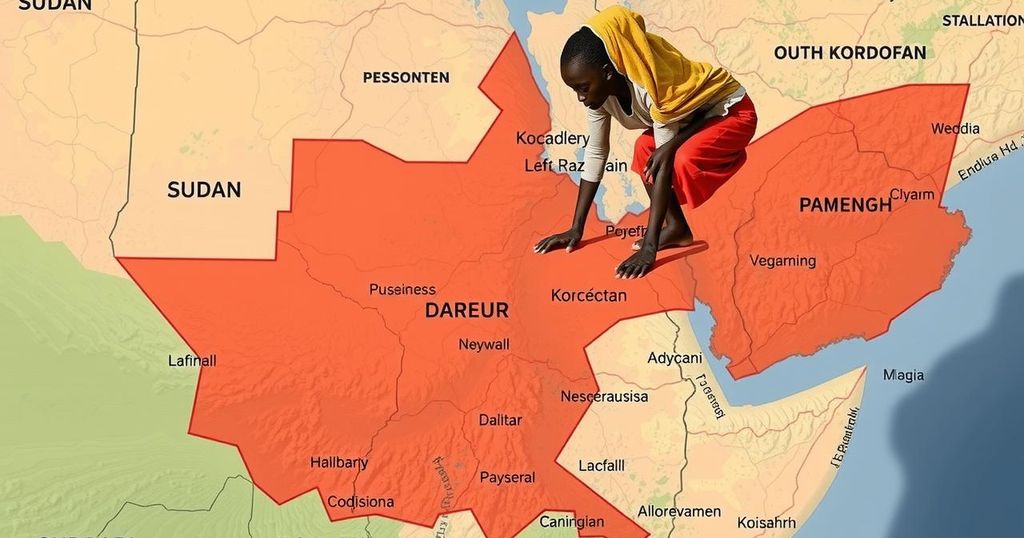Sudan Faces Severe Famine Crisis as Civil War Escalates
Sudan is experiencing a critical famine crisis affecting five regions, with 24.6 million people in desperate need of food aid. The ongoing civil war between the Sudanese army and RSF has exacerbated this humanitarian disaster. The IPC has raised alarms about worsening famine conditions, while the Sudanese government has retaliated against assessments from the IPC, citing national sovereignty. Immediate global support is essential to confront this escalating crisis.
Sudan is presently encountering a significant famine crisis exacerbated by the ongoing civil war that has persisted for approximately 20 months. An independent panel of food security experts has reported that five regions are currently experiencing famine, with a staggering 24.6 million individuals—roughly half the nation’s population—facing urgent food shortages. These hunger challenges are a direct consequence of the violent conflict between the Sudanese army and the paramilitary Rapid Support Forces (RSF), which deteriorated after a coup in 2021 and escalated into a civil war in 2023, resulting in catastrophic humanitarian outcomes.
Efforts to mediate a resolution to the conflict have consistently faltered, leading to one of the most severe humanitarian crises globally. A coalition led by the UN has issued grave warnings regarding the potential for an even broader catastrophe if hostilities persist. The Famine Review Committee (FRC), linked to the Integrated Food Phase Classification (IPC), emphasized that famine signifies a total breakdown of essential societal systems. Recently, the Sudanese military-backed government announced a suspension of its cooperation with the IPC, denouncing its findings as unreliable and harmful to national dignity.
Famine conditions were first identified in August in the Zamzam refugee camp, affecting around half a million individuals. The latest assessments indicate impending famine threats in additional camps within Darfur’s el-Fasher and regions of South Kordofan. With ongoing violence disrupting farming endeavors, widespread looting and the abandonment of crops have intensified the food crisis. Reports estimate that up to 150,000 people have perished due to the conflict, highlighting the need for immediate international intervention and support to address these urgent humanitarian needs.
The ongoing civil conflict in Sudan stemmed from a power struggle between military factions after a coup in 2021, resulting in widespread violence and social disarray. The International community, including various UN agencies, has been closely monitoring the situation due to its severe implications for food security. The war has devastated the country’s agricultural capabilities, leading to severe food shortages and triggering warnings of famine. Reports indicate that this crisis is exacerbated by the continued conflict, which is impeding aid efforts and further destabilizing the affected regions, particularly Darfur and South Kordofan.
In summary, Sudan is grappling with a deepening famine crisis resulting from prolonged conflict and governmental instability. With nearly half of the population in urgent need of assistance, the implications of this humanitarian disaster are dire. Failure to resolve the conflict risks further escalating famine conditions across additional regions. Immediate and effective international efforts are essential to mitigate the suffering of those affected and to restore stability and food security in Sudan.
Original Source: www.bbc.com




Post Comment